On the Ballot: The Survival of the American Labor Movement
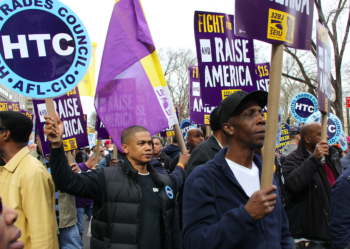
October 27, 2020 3:05 PM
Many Americans understand that a vote for the President is, in effect, a vote on the future of the U.S. Supreme Court, whose rulings will affect our civil liberties and rights for years to come. But Supreme Court Justices are not the only presidential appointees that have significant power over the lives of the American people. A group of lesser known presidential appointees that are effectively “on the ballot” each election are those to the National Labor Relations Board (“NLRB”). These appointees are responsible for protecting the rights of American workers to organize, join a union, and collectively bargain over their wages, benefits, and working conditions.
During his first term, Donald Trump packed the NLRB with former union busters who have spent their lives assisting employers to viciously avoid attempts by their workers to join a union. Whereas previous Republican Presidents attempted to move the needle in favor of employers and gradually reduce the effectiveness of the NLRB, Trump’s appointees have aggressively stripped workers of their already limited rights and given employers carte blanche to abuse their power.
As working people cast their ballots this election, they will be voting on the very survival of the American labor movement.
What is the National Labor Relations Act?
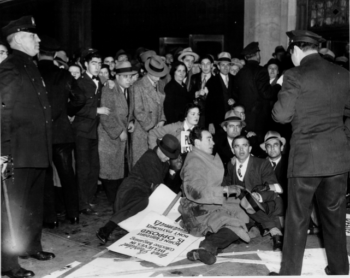
For centuries, the average American worked in dangerous conditions, lived in miserable poverty, and was totally powerless. Organizing to join a union and change these wretched conditions was a threat to the employer’s profits and total monopoly on power. Unsurprisingly, as such, it was very dangerous and sometimes even deadly.
In 1935, Congress enacted the National Labor Relations Act (“NLRA”), a federal law that gave private sector workers (like hotel and gaming workers) the legal right to organize a union, bargain collectively, and go out on strike. The law made it illegal for employers to fire, threaten, intimidate or retaliate against workers who organize a union.
The NLRA also created a federal agency, the NLRB, to enforce the law and protect the new rights of American workers. The President was given the power to appoint the NLRB’s five board members and General Counsel. Board members, who have a similar role to that of a judge, rule on the charges brought before them by unions, workers, and employers. The General Counsel functions similarly to a district attorney, deciding which cases go before the five board members and directing changes to labor law.
Trump packs the NLRB with union-busters
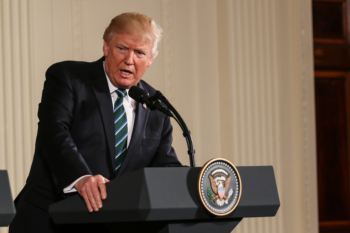
During his first term, Donald Trump appointed three radically anti-union board members to the NLRB. As Chairman, he appointed John Ring, who was the co-head of Labor & Employment at Morgan, Lewis, & Bockius, an infamous anti-union law firm that helped McDonald’s oppose the fight for a $15 minimum wage. Trump also appointed William Emanuel, a former partner at Littler Mendelson, a law firm specializing in union busting, as well as Marvin Kaplan, a former Republican congressional staffer.
Most damaging was Trump appointment of a new ultra-conservative General Counsel, Peter Robb. Robb got his start working with President Ronald Reagan during the 1981 PATCO strike. He counseled Reagan on how to fire nearly 12,000 striking air traffic controllers and break the strike, which ushered in an unprecedented era of union busting. The Reagan administration sent a message to American employers that it was possible to take on organized labor and in 1985, the New York City hotel industry took their own shot at our Union, trying to force us to accept a long list of givebacks in contract negotiations, which ultimately led to an industry-wide strike.
4 years of sweeping attacks on unions
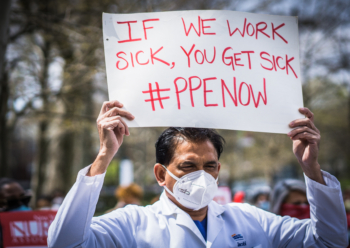
The Trump-appointed majority has rapidly gutted protections for workers and made it exponentially harder for workers to organize a union. What follows is a small sampling of the anti-union and anti-worker decisions issued during the Trump administration:
Trump appointees give employers tools to delay union elections
Under the Obama administration, the NLRB attempted to undo some of the previous Republican damage to the NLRA and inched back toward the true meaning of the law: to facilitate fair and quick elections when workers petitioned to be represented by a union.
For many years prior, employers would pay union-busting attorneys to employ countless legal tricks to delay a union election. By filing false charges, employers were often able to delay elections for years, which allowed them to viciously campaign and erode support for the union by holding mandatory meetings to lie about the union, interrogating workers about the organizing drive, and illegally firing known union supporters (with little repercussion). To win unionization, the workers needed to be near super-heroes, able to endure months of intimidation, confusion, and pressure to give up. Not to mention, they needed to keep each other motivated after every frivolous legal setback and terrorizing incident.
The Obama NLRB issued a new rule that eliminated many of the tricks that employers used to delay union elections, making it possible for workers to request and vote in a union election in only a matter of weeks. As a result of the rule, our Union was able to organize over a dozen non-union hotels and 1,000 workers with “speedy” elections.
In December 2019, Trump’s Labor Board rolled back the rule and effectively erased the progress made under the Obama administration. Once again, employers have more time to intimidate, coerce, and illegally fire union supporters before an election.
Trump NLRB suspends Union elections at the beginning of the pandemic
In March 2020, the NLRB used the Coronavirus pandemic as an excuse to unilaterally suspend all union elections, despite the fact that the NLRB could have held the elections by mail (and often does.) As a result, elections were delayed for thousands of workers who petitioned for union representation to address, among other issues, the need for affordable healthcare, paid sick leave, and a safe and healthy workplace during the pandemic. Meanwhile, the employers’ ruthless anti-union campaigns continued indefinitely. Weeks later, after a national outcry, the NLRB finally allowed union elections to continue.
Employers allowed to refuse to negotiate over sick leave, hazard pay, and layoffs
In August 2020, five months into the pandemic and with over 160,000 American lives lost to COVID-19, Trump’s NLRB issued an unfathomable advice memo directing that employers can refuse to negotiate with unions over paid sick leave, hazard pay, temporary closures, or layoffs due to COVID-19 until a union contract has expired. Just as many American workers were beginning to go back to work, the Trump NLRB undercut their right to negotiate for a safe return. Meanwhile, the Republican-controlled Senate is attempting to pass protections that would shield businesses from liability if workers contract COVID-19 on the job.
Trump NLRB upholds firing workers for raising safety concerns during COVID-19
In another especially callous advice memo, the Board directed dismissal of a charge by nursing home workers who were fired after speaking up when their employer required them to share personal protective equipment. During the worst public health crisis in a century, the Trump Board denied an individual employee protection under the NLRA when speaking out against an employer’s safety policies (or lack thereof) during COVID-19, and allowed them to be legally fired.
Not only is this guidance further evidence of the current Administration’s complete disregard for working people, it is also a change to decades of legal precedent. Previously, if a worker raised a concern that was clearly on behalf of the collective workforce, it was considered “concerted activity” and protected by law.
Trump NLRB denies “gig” workers the right to organize
Employers are becoming increasingly sophisticated at extracting profit from their employees while avoiding any legal or moral responsibility to them. Many businesses, including dozens of non-union hotels in New York and New Jersey, opt to hire “independent contractors” and subcontracting agencies to put distance between themselves and the workers who make their businesses run.
In May 2019, the Board gave employers the green light to continue exploiting these avenues when it issued a memo advising that Uber drivers are not protected by federal labor law, including the NLRA. This guidance means that they cannot organize a union, and it strips them of legal protection if they are retaliated against or fired for protesting for safer working conditions. The advice memo guidance extends to other workers in the growing “gig” economy, many of whom rely on their “gig” work as a second or third form of income because one job is not enough.
Trump appointees restrict workers’ freedom of speech
During a union organizing drive, employers have a huge advantage: unlimited access to the workers and the ability to force employees to attend anti-union meetings on paid time. Union organizers, on the other hand, traditionally have no access to the workplace and rely on the employees to speak to one another and build support for the Union. The long-standing rule of the NLRB has been that if a worker can discuss the Yankees on working time (or any other topic not related to the job), that worker has the legally protected right to discuss joining a union. During his term, Trump’s NLRB has issued decision after decision that restricts the rights of employees to discuss organizing a union at work and shifts the balance of power – already heavily skewed in favor of employers – even further in their direction.
In December 2019, Trump’s Board ruled that employers can forbid workers from discussing ongoing workplace investigations into unethical or illegal behavior, such as sexual harassment.
In May 2020, they issued a decision that expanded employers’ right to use “no solicitation” policies to discipline workers who are organizing a union. The Board broadened the definition of “solicitation” to include conversations where one employee encourages another to support the union on the clock.
While decades of precedent allowed all off-duty employees to organize in non-working areas like break rooms, in a clear attempt to stifle organizing, Trump’s NLRB ruled in August 2019 that workers do not have this right if their employer does not own the property where they work (for instance if the workers are subcontracted) and if they do not work exclusively at that property.
Management gains the right to listen to recordings of illegal activity submitted as evidence to the NLRB by the union
In New York, workers have a legal right to record their employer, without their permission. These recordings are critical evidence during an organizing drive, where employers break the law constantly and with near impunity. The recordings provide evidence of the illegal activity by employers and remove any doubt as to the employer’s actions.
In a complete reversal of past practice, Trump’s General Counsel Peter Robb recently issued guidance that the employer will have the right to listen to any recordings that are submitted as evidence of their illegal activity. As a result, the employer will know the names of the employees who submitted the recordings (which was previously confidential) and, under the rules of the employer's handbook, many employers will have a legal loophole to fire the workers who had the guts to testify and submit the evidence.
Peter Robb undermines neutrality agreements
During a union organizing drive, the biggest obstacle that we have to overcome is fear. Most non-union hotel and gaming workers want to join our union and get the benefits and protections of our contracts, but fear of retaliation, harassment, and possibly losing their job, leads many non-union workers avoid speaking to our organizers and to cast vote against the union.
Whenever possible, our Union negotiates agreements with employers that require them to remain neutral during an organizing drive. As part of the agreement, hotels and casinos traditionally had to give our organizers access to speak to their employees about the union in the break room, provide us with a list of the employees and their contact information, and agree to recognize the union as the legal representative of the workers if a simple majority sign union authorization cards.
The results are overwhelming. When fear is taken out of the equation, it’s often that 90% of the employees vote to join our Union in a single day. In the last decade, thousands of members have joined our Union quickly, easily, and safely because we took away their employer’s right to terrorize, lie, and intimidate them.
In early September, Peter Robb published a memo attacking these agreements and instructing the regional offices of the NLRB to declare common parts of card check neutrality agreements unlawful. Robb declared that practices such as allowing union organizers to access employee cafeterias, providing the union with employee contact information, and notifying the workers about the neutrality agreement provide too much help to unions and should be considered “illegal assistance” by an employer. Robb’s guidelines will make it harder for tens of thousands of non-union hotel workers in our city to join our Union in the years to come and will undoubtedly make our efforts to organize the non-union industry slower, more difficult, and more resource intensive.
“Now, the boss can only speak against the Union. Anything other than that – including neutrality - is considered illegal assistance by the Trump administration. Robb’s memo completely undermines the intention of the law and is one more corrupt move by the Trump administration to benefit the wealthy and the powerful in our country” said HTC President Rich Maroko.
Vote Donald Trump out on November 3rd
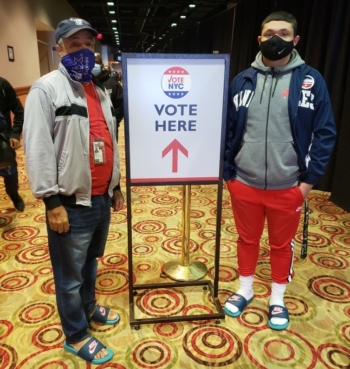
Donald Trump has shamelessly transformed the arm of the federal government that is supposed to protect American workers into a weapon against them. Without having to worry about re-election, a second term for Donald Trump would be even worse for working people. It doesn’t take much imagination to picture how our country could quickly regress to the unsafe working conditions of the early 20th century, which led to tragedies like the Triangle Factory Fire, and how our middle class could virtually disappear.
When you cast your ballot in the upcoming election, you are voting whether to allow these attacks on unions – including ours – to continue and intensify.
Click here to make a plan to vote. For members interested in volunteering with your Union to defeat Trump, click here for more information.


